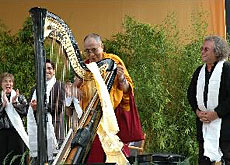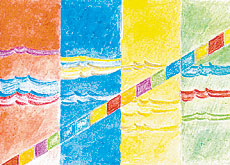New age harpist returns to the music scene

With a new album out, Grammy Award winning harpist Andreas Vollenweider tells swissinfo about his life, music and Swiss roots.
The Zurich-born musician introduced the harp into pop music with great success in the 1980s. His new album is titled VOX.
Vollenweider has made a name for himself in the United States in particular, where he is regarded as being at the forefront of “new age” music.
The son of a leading organist, he plays an electrically modified harp of his own design.
His buoyant rhythms, pan-cultural influences, and colourful harp improvisations began to make an impression in the early 1980s, culminating in a Grammy for his album Down to the Moon in 1987.
Vollenweider, who has worked with Carly Simon, Bryan Adams and Luciano Pavarotti, has recorded 14 albums, which have sold more than ten million copies. His latest album features vocals as well as the harp.
He is an active supporter of numerous human rights and environmental non-governmental organisations, and calls himself a “notorious believer in a better world”.
swissinfo: You grew up surrounded by musicians – your father, Hans Vollenweider, was a well-known classical organist.
Andreas Vollenweider: There were lots of creative people around me, not just musicians. Some of them were composers. My grandfather and my mother were painters and there were also dancers in the family. So it was very natural for me to pick up something myself and to try out everything before I decided which was the best medium for me.
swissinfo: So why did you choose the harp?
A.V.: I played piano first, then wind instruments and guitars. I was looking for the perfect instrument. And then I found this little Celtic harp because I was very much into collecting instruments. I didn’t really realise how important this would be for my future. It was only when I discovered the rhythm and groove on that instrument that it became more important. Suddenly there was this physical, sensual kind of playing which I was really looking for.
The harp introduced me to the fact that music is much more than we will probably ever know and it is much more than just acoustic decoration.
swissinfo: You were very successful in the 1980s. Have you managed to sustain this level of popularity?
A.V.: For 20 years I toured extensively. After the Grammy in 1987 I stopped touring. Since then I have done some concerts and bigger projects, also for films, which take up to a year to write and prepare. There is this passion [for music] which you don’t want to sacrifice, but it gets sacrificed by touring too much.
The other reason was that I had a family and I wanted to be around, because my father, as a musician, was never around.
Of course if you are away from the scene for a long time the number of listeners reduces. But I’m very surprised by how many people still remember me, especially in the US. And now we are gaining listeners in other parts of the world, such as India. And Africa is very strong, especially in South Africa, where we had 40,000 people at our last concert.
swissinfo: You also played for the Dalai Lama when he came to Switzerland. What did he say about your music?
A.V.: He speaks more with his gestures and his appreciation becomes obvious from the way he listens to music. I am, of course, very appreciative of his work. He wants to remind us of our positive potential and that’s exactly what I want to do, so we have a brotherly common ground.
swissinfo: If there were one Swiss quality to your music, what would it be?
A.V.: I think it’s exactly what I have just described. Our most wonderful contribution to the world is not the banks, but the positive potential of helping others. I am thinking of our humanitarian tradition, which started to grow very big with the [Swiss] Red Cross. Or when we make our country available for peace talks. This is what is associated with Switzerland abroad.
That’s why the outrage was so great when the Nazi gold scandal surfaced. This has damaged our reputation tremendously.
swissinfo: In your latest album one hears a recording of the thousands of people who protested in London against the Iraq war. But neither this opposition, nor that of intellectuals and artists around the world could stop the war.
A.V.: I think it’s important to say that we don’t like certain things and that we would like things to be different. I would like to be able to inspire people to shape their world, take action. Because if we don’t do it, the shape will be imposed on us.
It’s extremely important that we wake up, because we have slept for too long… It’s time to say something. I normally prefer to use music, because you can go much further and deeper.
swissinfo-interview: Raffaella Rossello
Andreas Vollenweider has sold more than ten million albums.
He is the only Swiss to have won a Grammy Award.
After a long break, Vollenweider has returned with a new album, VOX.
This is the first album which is not purely instrumental, as it also features vocals by Vollenweider and others.
He is currently on tour in Switzerland and will give a series of concerts in the United States beginning in California in April, 2006.

In compliance with the JTI standards
More: SWI swissinfo.ch certified by the Journalism Trust Initiative


You can find an overview of ongoing debates with our journalists here . Please join us!
If you want to start a conversation about a topic raised in this article or want to report factual errors, email us at english@swissinfo.ch.